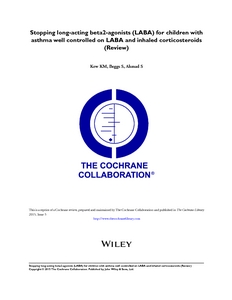Kew, KM; Beggs, S; Ahmad, S
(2015)
Stopping long-acting beta2-agonists (LABA) for children with asthma well controlled on LABA and inhaled corticosteroids.
Cochrane Database of Systematic Reviews, 5.
CD011316.
ISSN 1469-493X
https://doi.org/10.1002/14651858.CD011316.pub2
SGUL Authors: Kew, Kayleigh Marie Ahmad, Shaleen
![[img]](https://openaccess.sgul.ac.uk/107425/1.hassmallThumbnailVersion/CD011316.pdf)  Preview |
|
["document_typename_application/pdf; charset=binary" not defined]
Published Version
Download (330kB)
| Preview
|
Abstract
BACKGROUND: Asthma is the most common chronic medical condition among children and is one of the most common causes of hospitalisation and medical visits. Poorly controlled asthma often leads to preventable exacerbations that require additional medications, hospital stays, or treatment in the emergency department.Long-acting beta2-agonists (LABA) are the preferred add-on treatment for children with asthma whose symptoms are not well controlled on inhaled corticosteroids (ICS). The US Food and Drug Administration has issued a 'black box' warning for LABA in asthma, and now recommends that they be used "for the shortest duration of time required to achieve control of asthma symptoms and discontinued, if possible, once asthma control is achieved". OBJECTIVES: To compare the effect on asthma control and adverse effects of stepping down to inhaled corticosteroids (ICS)-only therapy versus continuing ICS plus LABA in children whose asthma is well controlled on combined ICS and LABA therapy. SEARCH METHODS: We searched the Cochrane Airways Group Specialised Register, and also searched www.ClinicalTrials.gov, www.who.int/ictrp/en/, reference lists of primary studies and existing reviews, and manufacturers' trial registries (GlaxoSmithKline and AstraZeneca). We searched all databases from their inception to the present, and imposed no restriction on language of publication. The most recent search was done in April 2015. SELECTION CRITERIA: We looked for parallel randomised controlled trials of at least eight weeks' duration, available as published full text, abstract only, or unpublished data. We excluded studies including participants with other chronic respiratory comorbidities (for example bronchiectasis).We looked for studies in which children (18 years or younger) whose asthma was well controlled on any dose of ICS and LABA combination therapy were randomised to: a) step-down therapy to ICS alone or b) continued use of ICS and LABA.We included any dose of LABA (formoterol, salmeterol, vilanterol) and any dose of ICS (beclomethasone, budesonide, ciclesonide, mometasone, flunisolide, fluticasone propionate, fluticasone furoate, triamcinolone) delivered in a combination inhaler or in separate inhalers. DATA COLLECTION AND ANALYSIS: Two review authors independently screened all records identified in the searches. We used a data extraction tool in Microsoft Excel to manage searches and document reasons for inclusion and exclusion, and to extract descriptive and numerical data from trials meeting the inclusion criteria.The prespecified primary outcomes were exacerbations requiring oral steroids, asthma control, and all-cause serious adverse events. MAIN RESULTS: Despite conducting extensive searches of electronic databases, trial registries and manufacturers' websites we identified no trials matching the inclusion criteria.After removing duplicates, we screened 1031 abstracts, and assessed 43 full-text articles for inclusion. We identified several adult studies, which will be summarised in a separate review (Ahmad 2014). The most common reasons for exclusion after viewing full texts were 'wrong comparison' (n = 22) and 'adult population' (n = 18).Some adult studies recruited adolescents from age 15, but none reported data separately for those under 18. AUTHORS' CONCLUSIONS: There is currently no evidence from randomised trials to inform the discontinuation of LABAs in children once asthma control is achieved with ICS plus LABA. It is disappointing that such an important issue has not been studied, and a randomised double-blind trial recruiting children who are controlled on ICS plus LABA is warranted. The study should be large enough to assess children of different ages, and to measure the important safety and efficacy outcomes suggested in this review over at least six months.The only randomised evidence for stopping LABA has been conducted in adults; it will be summarised in a separate review.
| Item Type: |
Article
|
| Additional Information: |
Copyright © 2015 The Cochrane Collaboration. Published by John Wiley & Sons, Ltd.
This review is published as a Cochrane Review in the Cochrane Database of Systematic Reviews 2015, Issue 5. Cochrane Reviews are regularly updated as new evidence emerges and in response to comments and criticisms, and the Cochrane Database of Systematic Reviews should be consulted for the most recent version of the Review. Kew KM, Beggs S, Ahmad S. Stopping long-acting beta2-agonists (LABA) for children with asthma well controlled
on LABA and inhaled corticosteroids. Cochrane Database of Systematic Reviews 2015, Issue 5. Art. No.: CD011316. DOI: 10.1002/14651858.CD011316.pub2. |
| Keywords: |
General & Internal Medicine, 11 Medical And Health Sciences |
| SGUL Research Institute / Research Centre: |
Academic Structure > Population Health Research Institute (INPH) |
| Journal or Publication Title: |
Cochrane Database of Systematic Reviews |
| ISSN: |
1469-493X |
| Language: |
eng |
| Dates: |
| Date | Event |
|---|
| 21 May 2015 | Published |
|
| Projects: |
|
| PubMed ID: |
25997166 |
 |
Go to PubMed abstract |
| URI: |
https://openaccess.sgul.ac.uk/id/eprint/107425 |
| Publisher's version: |
https://doi.org/10.1002/14651858.CD011316.pub2 |
Statistics
Item downloaded times since 30 Sep 2015.
Actions (login required)
 |
Edit Item |



